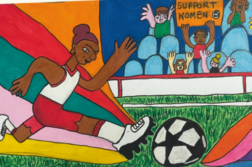“Sure, connect four is cool, but we’ve got a better idea!”
Leyton Orient, who haven’t played a competitive game of football since their 2-1 win over Cambridge United in early March, launched the ‘Ultimate QuaranTeam’ tournament as it became clear that football wouldn’t be returning in the near future.
🤷♂️ Sure, connect four is cool but we’ve got a better idea!
We need 63 other teams to enter a knock-out FIFA 20 tournament.
To enter, all we need is the club to RT this tweet.
We will host a live draw this Tuesday…
🙏 for an away day to @ManCity #UltimateQuaranTeam #LOFC pic.twitter.com/7aycsrn48r
— Leyton Orient (@leytonorientfc) March 15, 2020
The tournament’s initiative was to raise money for lower league clubs who were inevitably going to struggle as a result of the pandemic – and it was a great success, with many fans and bookies rallying around the tournament to make it an exciting fortnight early on in the lockdown.
Professional gamers, professional footballers and members of the public represented their football clubs from a whole range of countries and leagues. Wolverhampton Wanderers, represented by 19-year-old Brazilian professional gamer Fifilza, took the crown beating Dutchman NICK (aka Nick den Hamer) 2-1, who plays for FC Groingen’s e-Sports team.
The shutdown of professional sport was massively uncertain: no one knew – or indeed knows – when we will see packed stadia again. The alternative on TV was to stream old matches and relive great moments from the past, but fans knew nothing replaced live sport.

Hence, e-Sports have grown rapidly in the pandemic.
Gamers can play from the comfort of their homes, so long as they have a stable internet connection, without any risk of infecting others. During the height of the pandemic, with thousands of new cases of infection in the UK alone in April every day, tournaments like this could go on in relative peace.
E-sports was a growing industry without the pandemic and indeed there is huge money to be made. The biggest prize pool in the gaming world is competitive playing of Dota 2, which sees an annual tournament (named ‘The International’) take place in an arena. The winners of the competition win a prize pool, most recently over $34m USD in 2019.
Some would say e-sports is the wrong term and indeed no-one would expect the government to support an industry which requires people to stay indoors with no exercise. However, e-sports have seen a huge growth in audience as a result of the pandemic and may have found some new long-term fans.
What’s interesting right now is how traditional sports are using sports simulation to reach and engage with their fans,” Trev Keane, head of sport and esport at 7F, told the BBC in April. He continued:
“In the last few weeks we’ve seen Formula One, Nascar, football clubs, football players and the NBA among others all do that. It’s that shift that’s really become very interesting and the industry has proved how resourceful it is.
“Companies are looking at ways of keeping their brands alive and to potentially give them another revenue source.
“I think what we’ll see on the back of this is that more club owners, especially in the UK and Europe, will see e-sports as a viable investment option.”
Analysis: It may be fun to watch in the short term, but the health impacts can’t be discounted
I am prone to a good game on FIFA here and there (though ‘good’ is probably the wrong word to use if you look at my statistics), and watching some of these professionals has been impressive to say the least during the pandemic. However, whether e-Sports take off or not as a result of the pandemic, it is important to consider some of the dangers of e-Sports’ rise.
Firstly, during a time when the government is – rightly or wrongly – trying to tackle the obesity epidemic in the UK, it is unlikely that you’ll see Oliver Dowden, the DCMS secretary, promoting staying in and trying your skills in Pro Seasons. Now that we are allowed to, going out and playing sports is where the focus should be.
Moreso, to become a professional takes some hard graft (as one would expect in any sport). Training to be a pro athlete will naturally take huge effort and a lot of pressure, but at the very least you get an experience of the outside world. Training to be a professional gamer would take ‘eight to twelve hours a day’ locked in a room. Or, as Ryan Scallon told the BBC, ‘something called ‘the grind’ where [e-Sports athletes) get on the game and they play it for as long as they can – just play, play, play. It’s unstructured training. The grind is giving kudos, you’re seen as a bit of a legend the more you ‘grind”.
The risk of poor mental health, poor physical health and the sheer level of training necessary may mean that e-Sports doesn’t take off, as much as lockdown may have helped it to.
I think I personally will stick to losing games whilst representing Fleetwood Town on FIFA 20 – until my student loan means I can afford FIFA 21.



